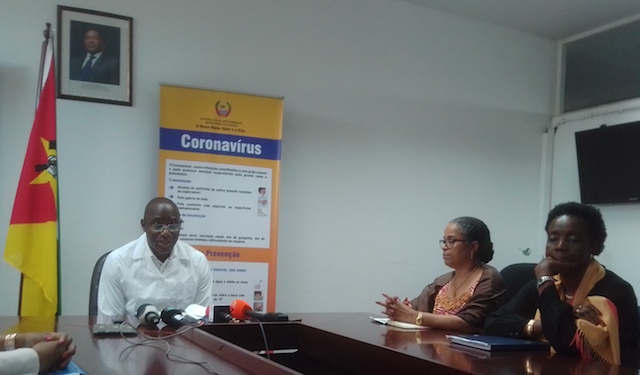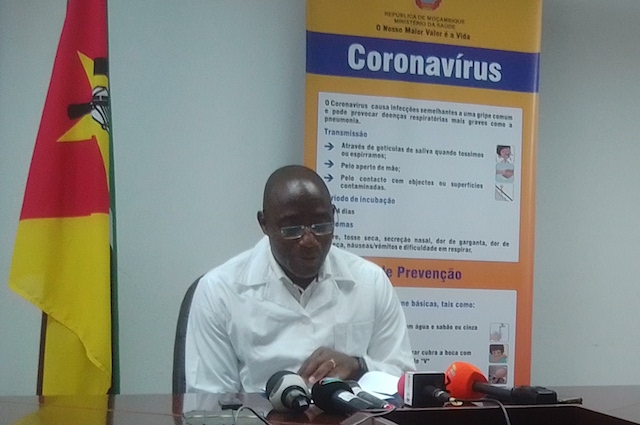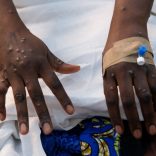Mozambique: AfDB-led training programme builds national capacity for climate disaster response
Teachers and students “must stay at home,” says Minister | Mozambique does not have the capacity to comply with the “test, test, test” WHO recommendation – A Verdade

Photo: A Verdade
- Teachers and students from public and private schools “must stay at home. Staying at home without leaving home is essentially quarantine. They don’t go to school, but they don’t go to the park – they don’t go to school, they stay at home”.
“We have a simple message to all countries – test, test, test,” the director-general of WHO recommends, but @Verdade found that Mozambique’s National Institute of Health (INS) can only carry out 396 tests per day, and Mozambique already has fewer than 2,500 test kits. Meanwhile, the Minister of Health clarified that the closure of all public and private schools from pre-school to higher education is not a vacation, it is a home quarantine: “They don’t go to school and they stay at home.”
A week ago, the director-general of the World Health Organization (WHO) recommended carrying out large-scale tests on suspected cases of the new coronavirus and isolating patients to contain the pandemic. “We have a simple message for all countries: Test, test, test. Test every suspected case. If they test positive, isolate them and find out who they have been in contact with two days before they developed symptoms and test those people, too,” Tedros Adhanom Ghebreyesus recommended,.
This WHO recommendation was reiterated by Chinese doctors who last week shared their experiences with African colleagues via video conference.
As of this Sunday (22), only travellers from China, South Korea, Iran, Italy, France, Germany, Spain, Switzerland, Denmark, USA, United Kingdom, Netherlands, Sweden, Norway, Portugal, Greece, Belgium, Austria, Pakistan and Canada are required to stay in a 14-day home quarantine in Mozambique.
Although health officials having screened 338,427 people from countries confirmed with Covid-19 by measuring temperature and according to country of origin, they have carried out only 46 actual tests, of which only one tested positive – a citizen who arrived last week from United the Kingdom.
It is a matter of public record that Mozambique has only reagent kits for 2,500 tests, so health authorities are managing them according to the highest priority cases of infection.
@Verdade has further established that, at present, the National Health Institute (INS), the only institution that carries out the WHO-approved tests, can only carry out 132 PCR-technology tests per eight-hour shift. INS Director General Ilesh Jani says the institution has three shifts per day, so can perform 396 tests per day. Over the next week, capacity will be increased to 222 tests per shift.
However, if health authorities try to comply with the World Health Organization’s recommendation, all reagent kits in Mozambique will be exhausted within four days.
All provinces of Mozambique with isolation sites
At the press conference where he announced the positive result of the first citizen infected with Covid-19 in Mozambique, Minister of Health Armindo Tiago explained that: “the patient has mild symptoms, is in isolation at home, and is in clinical follow-up”, and was not going to be admitted to hospital.
“We have explained that the majority of people who have infection with Covid-19 are people who have mild symptoms, such as this one (confirmed in Mozambique). Eighty percent of individuals who will eventually contract the disease will have mild symptoms and there will be no need for them to be hospitalised; only 20 percent will require hospitalisation. The whole process of defining the criteria that define severity already exists in our protocols and, when we have a case that requires hospitalisation, we will tell the media,” the minister explained, recalling that China, with over 81,000 infected, had had “only about 3,300 deaths. All others have recovered, so the chances of recovery are very good”.
In response to questioning by @Verdade, Minister Armindo Tiago clarified that “each province will have a place of isolation. In Maputo City, in addition to the isolation at Polana Caniço Hospital, the Central Hospital of Maputo will also receive coronavirus cases. We have an isolation ward prepared ward for this purpose. If there is a greater number of patients, we have the private sector, which has beds readyto receive patients with coronavirus”.
But the first Mozambican citizen diagnosed with the new coronavirus is a doctor who lives and works in Spain, where, according to the Minister of Health, he is hospitalised in a stable situation and showing improvement.
Home quarantine for teachers and students in Mozambique

Answering another question from @Verdade, Minister Armindo Tiago pointed out that, among the measures to counter the Covid-19 pandemic announced on Friday (20) by the President of the Republic, it was laid down that teachers and students from public and private schools, which have been closed from 23 March to 21 April, “must stay at home. Staying at home without leaving home is essentially quarantine. They don’t go to school, but they don’t go to the park – they don’t go to school, they stay at home”.
As to citizens who are not teachers or students, the Minister of Health clarified “you have to go to work: so far there is still no measure in relation to that”. However, “There may be a need in time to adjust the measures according to the circumstances. On Tuesday, the Council of Ministers may decide to escalate the measures currently in place, or not”, Minister Tiago warned.
Home quarantine for all Mozambicans has not yet been declared, as Assembly of the Republic must meet, at least this week, to approve the Government’s Five-Year Plan, the Economic and Social Plan and the Budget Law of 2020
Closing all public and private schools from pre-school to higher education presents a major challenge in Mozambique, since it means at least 15 million Mozambicans staying at home.
The prospect of parents and guardians, who have to go out every day to earn a living, keeping children and young people studying is unrealistic. Distance learning or new technologies will be a privilege available only to a few of the millions panicking at the discovery of the first Covid-19 case confirmed in Mozambique.

Also challenging for most Mozambicans is complying with another major measure to reduce the risk of contracting or transmitting Covid-19. “Washing your hands frequently with soap and water or ash, for at least 20 seconds,” is a pipe-dream for the many Mozambicans who still have no running water at home or even a tap in the yard. For many Mozambicans, obtaining 20 litres of water means walking several kilometres or even facing crocodiles in rivers and lagoons.
In addition to the loss of human life, more dramatic still could be the impact of the new coronavirus on the capacity of most Mozambicans to meet their most basic daily needs. The country has been in recession since 2016, and the economic and financial crisis may worsen further.
By Adérito Caldeira












Leave a Reply
Be the First to Comment!
You must be logged in to post a comment.
You must be logged in to post a comment.